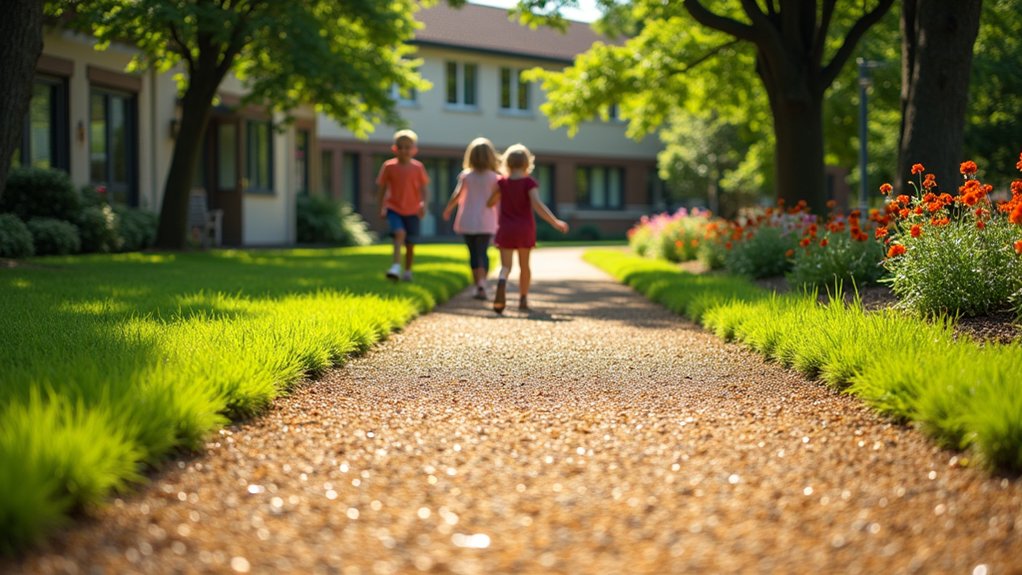Resin-bound gravel proves ideal for school grounds across the UK, delivering a smart, hard-wearing surface that prioritises safety and access. The non-slip surface allows smooth travel for wheelchair users and offers reliable grip across different areas, from playgrounds to walkways. It needs little upkeep and helps the environment by letting rainwater drain naturally through the surface, reducing puddles and flooding risks. Schools can choose from various colours and patterns to create distinct zones – for instance, marking out sports areas or creating engaging playground features. This practical surface transforms standard school grounds into safer, more sustainable spaces that work year-round in British weather.
Key Takeaways
Resin-bound gravel offers key benefits for school grounds:
Safe and slip-resistant surfaces perfect for busy areas like playgrounds and parent pick-up zones. Think of it as a more attractive version of traditional playground surfacing.
Excellent drainage capabilities mean no more puddles or waterlogged areas after heavy British rainfall – particularly useful for all-weather sports areas and walkways.
Available in various colours and patterns to match school branding or create distinct zones, whilst serving as a practical teaching tool for environmental studies.
Proves cost-effective over time, requiring little upkeep beyond occasional brushing and pressure washing. No more annual repairs typical with tarmac or concrete paths.
Made partly from recycled materials, supporting schools’ eco-friendly initiatives and helping meet sustainability targets. Local wildlife benefits from improved drainage and reduced surface run-off.
Safety and Accessibility Features
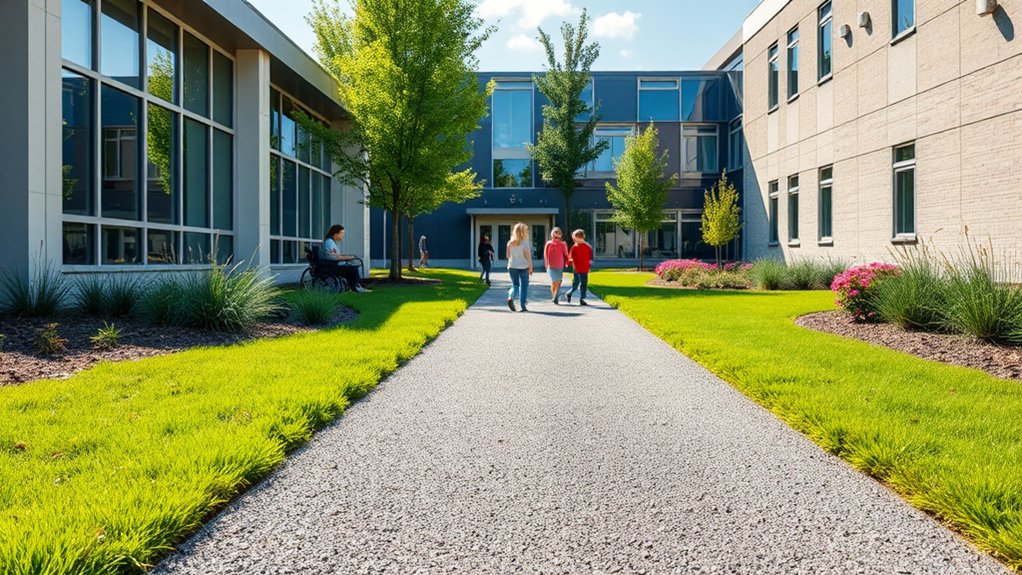
Safety and Accessibility Features
Resin-bound gravel surfaces offer vital safety features across school grounds, particularly in busy areas. The non-slip surface creates stable, even pathways that cut down accident risks – essential for British weather conditions. Unlike loose gravel, there’s no scattered stone hazard, and the surface stays grippy even during wet playtime. Regular maintenance practices, such as preventing moss build-up, help ensure the surface remains safe year-round.
These paths work brilliantly for everyone’s access needs. The smooth finish means wheelchair users and parents with pushchairs can move about easily, much like on standard pavement. Adaptability of Resin Surfacing enables these surfaces to perform consistently while meeting specific environmental requirements.
Think of it as creating paths that work as well for a Year 7 student rushing to class as they do for a grandparent attending sports day. Different grip levels can be fitted to match specific areas – stronger for slopes, standard for straight paths.
Adding resin-bound gravel makes school grounds both safer and more accessible, ticking all the boxes for modern school requirements whilst looking smart.
Durability and Maintenance Advantages
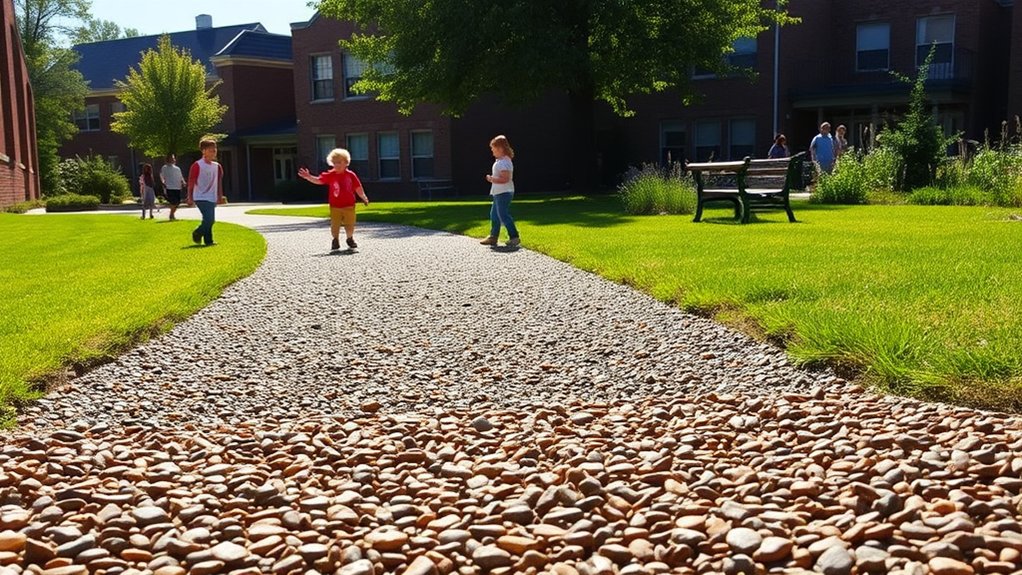
Resin-bound gravel outperforms traditional surfaces in busy school settings, offering exceptional durability and minimal maintenance needs. It withstands daily wear and tear without cracking, even in harsh British weather conditions, making it ideal for heavily-used areas like playgrounds and walkways. The surface needs little more than occasional sweeping and annual pressure washing, freeing up maintenance budgets for other essential work. Additionally, the option to incorporate slip-resistant additives enhances safety, especially in wet areas commonly found in school environments. This versatile surface is also environmentally sound due to the use of local aggregates and recycled materials, promoting sustainability within school campuses.
| Feature | Benefit | Impact |
|---|---|---|
| Weather Resistance | Handles extreme climates | Reduces damage risks |
| Low Maintenance | Minimal upkeep required | Saves time and costs |
| UV Stability | Prevents discolouration | Maintains visual appeal |
The long-term performance of resin-bound gravel delivers value for money, proving particularly cost-effective for UK school budgets whilst maintaining a smart appearance year-round.
Environmental Benefits of Resin-Bound Gravel
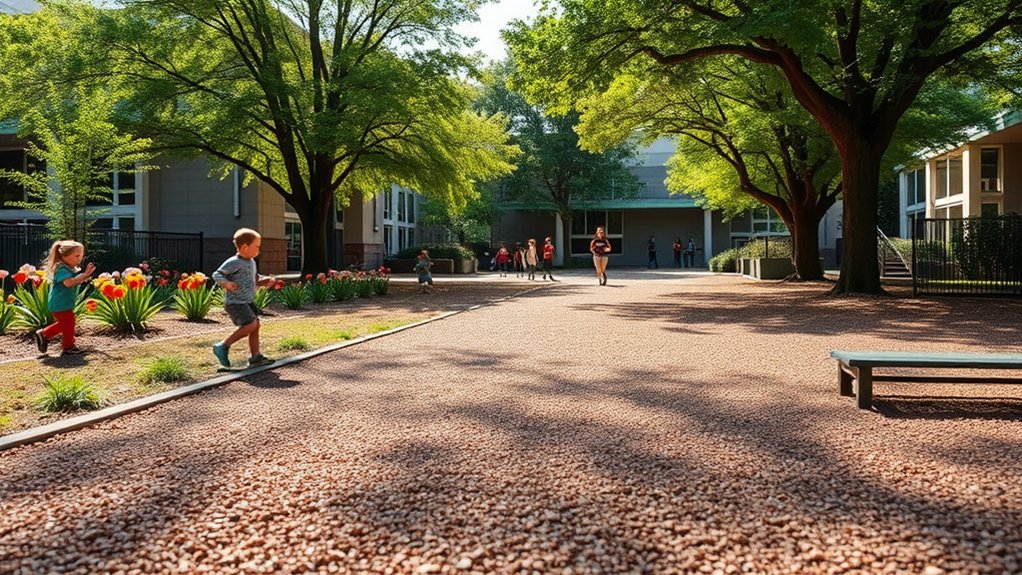
Resin-bound gravel offers substantial green benefits beyond its smart appearance on school grounds.
Its permeable surface lets rainwater soak through naturally, reducing flood risks and topping up groundwater levels – much like a giant sponge for your outdoor space. The system filters out harmful substances before they reach local streams and rivers, whilst many UK suppliers now use recycled materials in their mixes, cutting down on quarrying needs. The longevity of resin-bound driveways reduces material production and waste, making them an even more sustainable choice. This innovative permeable paving solution not only supports local ecosystems but also enhances property value.
The lighter-coloured stones help keep surrounding areas cooler in summer, similar to choosing a white t-shirt over a black one on a hot day. This means nearby buildings stay cooler too, lowering air conditioning costs.
With its eco-friendly features, resin-bound gravel creates better conditions for local wildlife and plant life, making it a brilliant choice for schools looking to boost their green credentials.
Cost and Installation Considerations
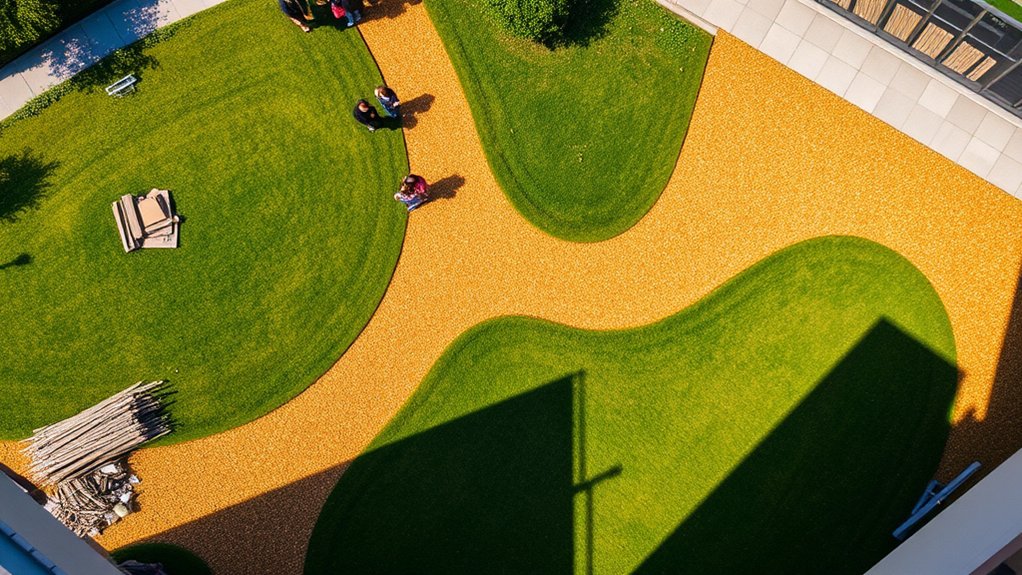
Cost and Installation Considerations for Resin-Bound Gravel
Installation costs typically range from £9.50 to £13.20 per square metre, including materials at £4.85 to £7.35 per square metre. Labour charges for a standard installation (roughly 11 hours) add between £625 and £980 to the total cost.
To keep costs down:
- Buy materials in bulk
- Ensure thorough site preparation
- Plan efficient work schedules
- Minimise waste during installation
- Consider seasonal timing (spring/summer installations often work best)
The finished surface needs proper installation by skilled contractors to handle heavy foot traffic and maintain its appearance. A typical school playground or pathway installation can be completed within 1-2 working days, depending on the area size and weather conditions.
For best value, focus on proper groundwork preparation – it’s cheaper to do it right the first time than fix issues later.
Most installations last 15-20 years when properly installed and maintained.
Design and Educational Integration Opportunities
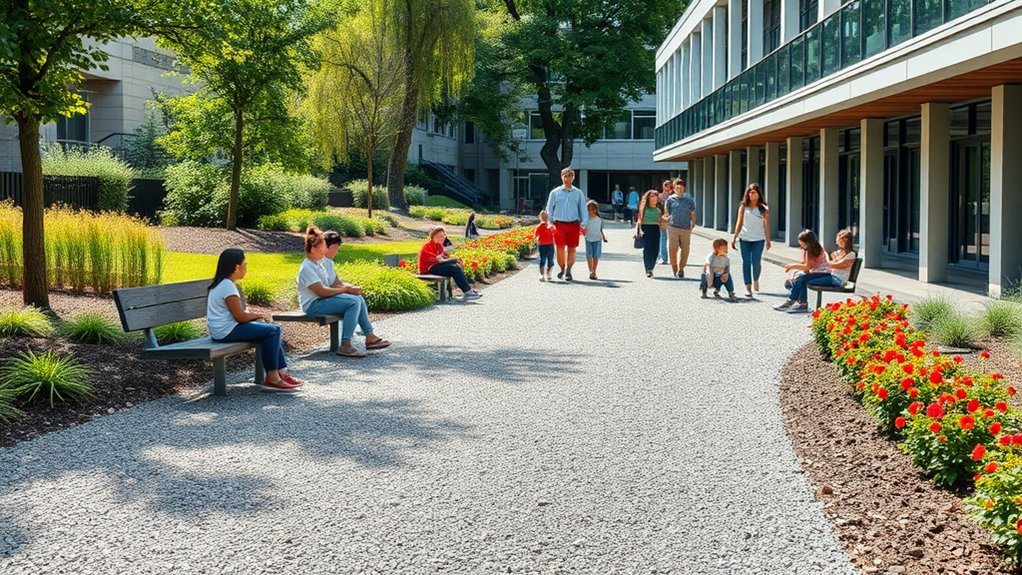
Design Integration in School Settings
Resin-bound gravel offers practical solutions for transforming school grounds into engaging learning spaces. The material’s customisable colours and patterns complement existing buildings whilst creating safe, slip-resistant areas for outdoor lessons.
Its permeable nature supports green initiatives, making it ideal for teaching environmental awareness and sustainability. The surface proves particularly useful for British weather, handling heavy foot traffic and frequent rain without deteriorating.
Schools can mark out learning zones, create nature study areas or design social spaces that work year-round. These robust surfaces are perfect for everything from science demonstrations to art activities, helping teachers take learning beyond classroom walls.
The material’s durability and low maintenance requirements make it a sensible choice for UK schools looking to maximise their outdoor space whilst keeping costs manageable.
Its environmentally friendly properties align well with sustainability curricula, offering real-world examples of eco-conscious design that pupils can see and interact with daily.
Frequently Asked Questions
How Does Resin-Bound Gravel Compare to Traditional Paving Materials?
Resin-bound gravel outperforms traditional paving in both looks and value for money. The seamless finish creates an elegant surface that’s particularly suited to British driveways and garden paths. Unlike standard block paving or concrete, it won’t crack or shift during our wet winters, making it a practical, long-lasting investment for UK homeowners.
Can Resin-Bound Gravel Be Repaired if Damaged?
Yes, resin-bound gravel can be repaired quite effectively. For minor damage, simply clean the affected area thoroughly and apply a matching resin-aggregate mix. Larger issues might need professional attention, where damaged sections are cut out and replaced. Most repairs blend seamlessly with proper colour matching, though it’s worth noting that heavily trafficked areas may need more frequent maintenance to keep the surface looking its best.
What Is the Lifespan of Resin-Bound Gravel Surfaces?
Resin-bound gravel surfaces last between 15 and 25 years when properly installed and maintained. Think of it like a good quality driveway or garden path – with regular cleaning and basic care, it’ll serve you well for decades. The key to maximising its lifespan lies in professional installation and occasional sweeping to prevent debris build-up.
Is Resin-Bound Gravel Safe for Playgrounds?
Resin-bound gravel provides good grip underfoot, making it fairly safe for playground surfaces. Think of it like a rougher version of tarmac – children won’t slip easily when running about. Whilst it’s tough and resists mould well, it’s worth noting that rubber surfaces or bark chippings offer better impact protection when little ones take a tumble. Best suited for pathways and low-impact play areas rather than beneath climbing frames or swings.
How Does Weather Impact Resin-Bound Gravel Performance?
Weather greatly affects resin-bound gravel surfaces, much like how British pavements react to our varied climate. Extreme heat can soften the resin, whilst freezing temperatures may cause it to become brittle. Heavy rainfall poses a particular challenge, as too much water absorption can lead to surface blemishes and affect the overall strength of the installation. These issues typically impact both the appearance and longevity of the surface.
Conclusion
Resin-bound gravel offers practical benefits for school grounds, creating safer and more accessible pathways across campus. The smooth, permeable surface handles British weather well, reducing puddles and ice patches during wet months. Students can move easily between buildings whilst the surface maintains its grip, even in poor conditions. The material proves cost-effective over time, requiring minimal upkeep compared to traditional surfaces like tarmac or loose gravel. Its durability withstands heavy foot traffic in high-use areas such as entrances and communal spaces, whilst its varied colour options can complement existing architecture or create clear wayfinding routes. As a sustainable choice, it allows water drainage and can incorporate recycled materials, supporting schools’ environmental commitments.
